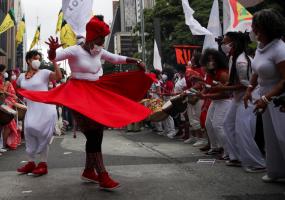Media Systems, Public Knowledge, and Democracy
20 Nov 2007
Pallavi Aiyar writes:
'Does the media architecture of a country have an influence on the level of political knowledge displayed by citizens?' The answer, according to James Curran, Professor of Communications at Goldsmiths College, University of London, is a modest 'yes'.In collaboration with other colleagues, Professor Curran recently conducted research into the impact that the ownership structure of media has on the availability of different kinds of news in the United States, the United Kingdom, Finland and Denmark. The aim of the research was to assess what, if any, differences could be found between public broadcasting systems and commercial broadcasting when it came to the news mix on offer, vis-a-vis hard news and soft news as well as foreign and domestic news. The idea was to investigate the connections between media systems and what people know about politics Prof. Curran's research revealed Finish and Danish public service broadcasting airing more hard news with a greater outward orientation than the United States' commercial networks. The UK with its mixed system was found to be closer to the US model devoting much time to international soft news but lagging behind Finland and Denmark in both domestic and foreign hard news. When it came to the investigation of citizen's political knowledge, the US public was revealed to be the most ignorant followed by the UK, with Finland and Denmark coming out on top. However, no simple or direct link between the broadcasting systems and knowledge of politics could be drawn. After running a variety of statistical tests Curran's research showed 'an interest in politics' to be the key indicator of political knowledge, followed by other societal factors like education and gender. The organisational structure of the media was thus only a secondary indicator of political awareness, although Prof. Curran also stressed the finding that the greater the prominence given to a topic by the media, the greater was the knowledge of that topic amongst citizens. In conclusion, Prof. Curran felt that a public broadcasting model was more conducive than commercial broadcasting to foster higher levels of news consumption and in reducing the knowledge gap between the advantaged and disadvantaged sections of society. He ended on a sombre note, predicting that were the commercialisation of the media to continue apace it would lead to a decline in serious journalism with deleterious effects for democracy. Prof. Curran's talk sparked a lively debate. But while his research provided much food for thought it did leave unanswered the fundamental question of what determined "an interest in politics" given that this, rather than media structure, was found to be the factor most closely correlated to political knowledge.





